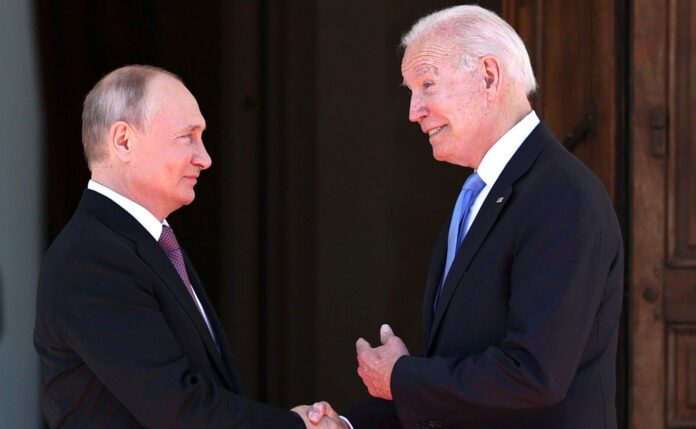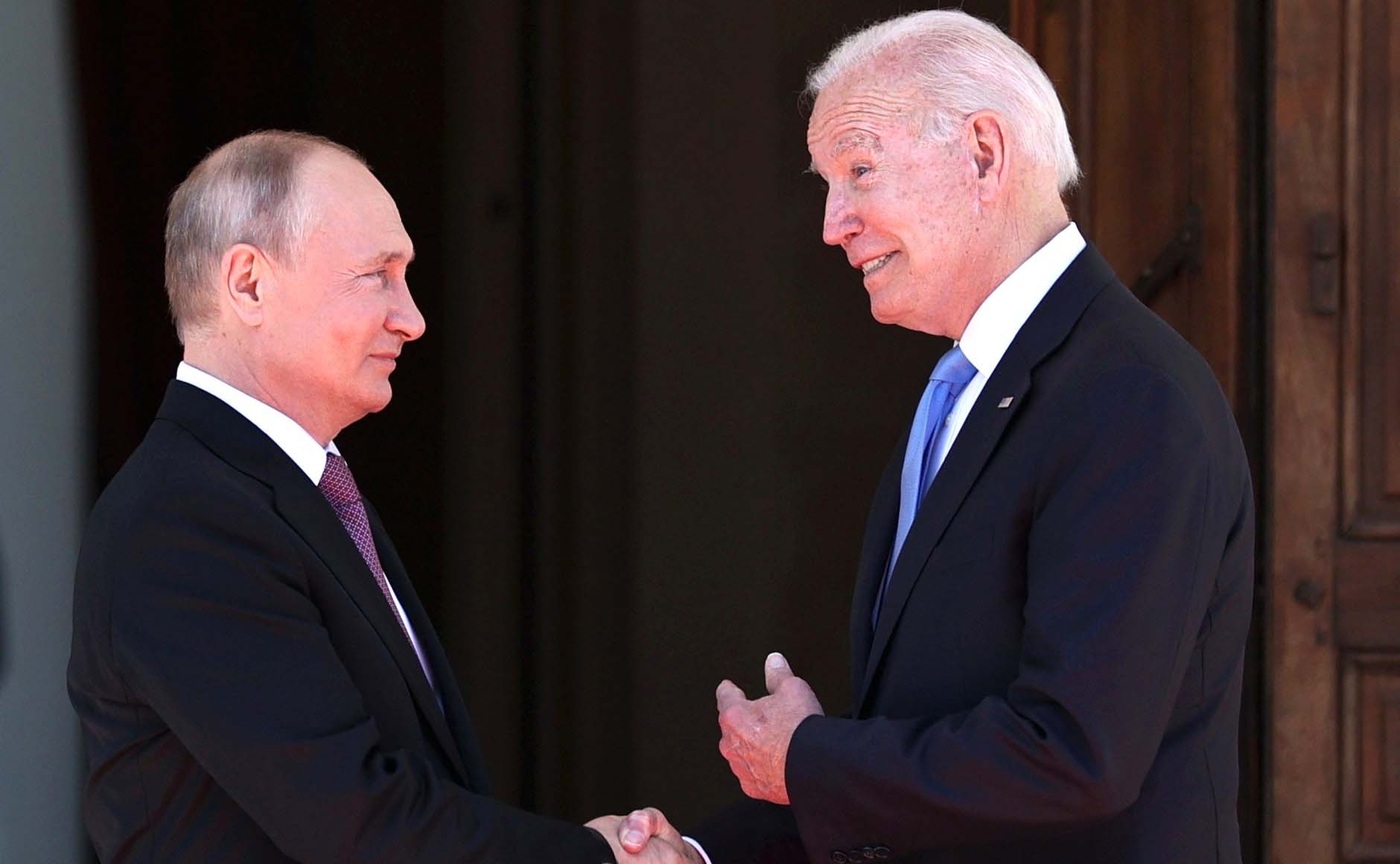The video-meeting between Biden and Putin on December 7 has given rise to much speculation in the small world of experts. Biden having previously consulted with France, Great Britain, Germany and Italy, and having threatened Putin with drastic sanctions if he attacked Ukraine, one might have thought that the West had finally decided to stand up to the Russian blackmailer who held a loaded gun to the head of his Ukrainian hostage. Alas, the days that followed cruelly dispelled this illusion.
« An Appeaser is one who feeds a crocodile, hoping it will eat him last »
— Winston Churchill
We learn that the United States is ready to “discuss Russian security concerns” (“address Russia’s concerns”). This formula, which repeats word for word the terms of Putin’s ultimatum formulated on the eve of the meeting, indicates either a total lack of understanding of Russian policy or, more likely, the capitulation of the United States to Russian blackmail, which does not only concern Ukraine: on 30 November Putin had declared that Russia was ready to deploy a “new hypersonic naval missile that could reach [Western] decision-makers in 5 minutes”. Putin was referring to the famous Tsirkon hypersonic cruise missile, which can carry a nuclear warhead and be used against land targets. The Russian president suggests that he has the option of sending Russian warships or attack submarines into the Atlantic, several hundred kilometers from Washington, to wipe out the city in a sudden attack aimed at “decapitating” the adversary by eliminating the “decision-makers” before they manage to take cover or flee. This is the threat of a first strike: of course there will be a way to retaliate. What is important here is that the logic is not one of dissuasion but of coercion.
In this regard, let us deal once and for all with the endless arguments of those who assure us that Russia feels threatened, that its security concerns are “legitimate”. Let us remember that in 1944, when the Red Army was sweeping through Europe, Stalin was already using these arguments to justify to Roosevelt the installation of “friendly governments” (i.e. dominated by communists in the pay of Moscow) in the countries of Central and Eastern Europe.
Today there are still Westerners who explain to us that Russia is rightly worried about NATO approaching its borders. One only has to look at the Russian press to realize that for a long time Russian leaders have had nothing but contempt for their Western counterparts, whose venality and weakness they know only too well. As early as 2008, NATO was perceived, as Dmitri Rogozin, then Russia’s ambassador to NATO, said at the time, “not as a military bloc but as an amorphous and flabby political club” that is showing its weakness in Afghanistan. Lately the Russian press has had a field day after the American debacle in Kabul, it is licking its lips in anticipation of a similar evacuation of the Americans from Kiev, and the Kremlin would like to persuade us that Russia is trembling in front of the NATO forces in Central Europe! A regime that has enjoyed perfect impunity for more than 20 years, despite its aggressions, its crimes, its shameless provocations, the permanent state of war that it maintains outside and inside, would be afraid of democracies tetanized in its presence? The reality is that Russia wants to destroy NATO not because it represents a threat, but because it is the last obstacle to Russian blackmail in Europe, to the establishment of Moscow’s hegemony on the continent.
Today, Putin is obtaining what Moscow has been seeking for many years. In 1997, when Primakov, the then foreign minister, was trying to reduce the effect of the forthcoming NATO enlargement to zero, he demanded that Russia should have the right of veto on all European security issues in the future NATO-Russia Council, but this was firmly refused by President Clinton. In the spring of 2008, as the United States was sinking into the subprime crisis, Russia felt in a position of strength and President Medvedev, who had just been elected, proposed the establishment of a new security system in Europe. Russia’s ulterior motives are apparent in the first formulations of the draft pact, as stated by Medvedev on June 5: “It is important that all European states participate as national states, excluding considerations of blocs or groupings. Naked national interests must be decisive”, “distorting ideological motivations” (i.e. the concern for the respect of fundamental freedoms) must be put aside.
It is by putting forward “energy security” that Moscow intends to bring the Europeans to accept its “pan-European system”. The Russian intentions are explicitly expressed here: the aim is to marginalize the United States in European security, to eliminate the post-war European order, in the name of “national interests” understood by the Kremlin as the priority given to energy supplies and therefore the quest for Moscow’s goodwill. If this scenario were to come true, Russia would find itself at the heart of the European security system, facing dispersed and isolated states, vulnerable to its energy blackmail, without the slightest counterweight. The Russian-Georgian war that broke out two months later had above all the objective of showing Europeans that the alliance with the United States was no longer worth anything. In the aftermath, Moscow tried to relaunch its project for a new European security system. It was a failure, largely compensated by the “reset” policy introduced by the West, from which Russia took advantage to modernize its arsenal thanks to cooperation in military technologies with Americans and Europeans (especially France), which allowed Moscow to develop the weapons of the apocalypse that it threatens us with today.
Putin had an objective in accepting the video-meeting with Biden: to see if his crescendo of provocations, the deployment of forces on the borders of Ukraine, the blackmail of migrants in Belarus, the polluting spraying of his satellite into space, had broken the American president. The test had been signaled beforehand by Fyodor Lukianov, an analyst linked to the Kremlin: according to him, the meeting would be considered a success if Biden recognized Russia’s “concerns” and agreed to discuss them in ad hoc working groups. The result could not be more satisfactory for Moscow. According to military expert Constantin Sivkov, “after his conversation with Vladimir Putin, the current U.S. president realized that in the event of a nuclear war, things would not be limited to the Ukrainian theater. The blow would be directed at the United States, and its allies, and American bases. Americans will perish in large numbers.”
As a result, mentions of new sanctions against Russia were dropped despite congressional resistance. Biden agreed that strategic talks between NATO allies and Russia would be held if the threat of invasion of Ukraine were suspended. Forgetting that uncertainty is a major factor in deterrence, the American president committed the egregious blunder of declaring that he would not consider sending American troops to defend Ukraine. Worse, he announced that “high-level meetings” between Russia and at least four NATO members would be held to address the Kremlin’s “concerns” about NATO. By marginalizing the countries of Central and Eastern Europe, he implicitly recognized the Russian “zone of influence” in Europe.
Russian leaders have no more cherished dream than initiating talks to decide the fate of third countries in their absence: thus the Ribbentrop-Molotov pact is considered in Russia as a great triumph of Kremlin diplomacy; Stalin’s laurels do not leave Putin in rest. Senator Pushkov did not fail to pour salt on the wound: “European countries are not autonomous in this matter, especially Poland. The decision here lies with the United States… Therefore, it is more logical to have a conversation about this between Moscow and Washington. And in this case, Poland’s opinion in this strategic equation does not count: Poland does not carry much weight and does not have a place at the table of the great powers”. And if Washington argues that its allies are opposed to the commitments made, Moscow will know what to expect: “If they tell Washington that they cannot persuade their NATO allies, it means that Washington itself does not want an agreement with Moscow”. Experts close to the Kremlin note with satisfaction that since the arrival of the Biden administration, “Russia’s position has improved. For example, the United States has lost its strategic initiative in Eastern Europe.”
But that’s not all. Putin has long relied on France and Germany to force Ukraine to comply with the Minsk agreements in their Russian interpretation, reverting to a planned disintegration of the Ukrainian state, forced to integrate the separatist enclaves controlled by the Russian services (Russia has begun to massively distribute Russian passports to the local population, the leaders of the two territories have joined Putin’s United Russia party, Russian currency circulates there, not Ukrainian hrivnas). Last November, to his surprise, the French and Germans refused to play this dishonorable role. Never mind: Putin will do better, he will entrust the United States with the task of extracting capitulation from Ukraine.
Already the US administration is suggesting that the US will encourage Ukraine to “grant some autonomy to the Donbass region”. The U.S. side has already said it is ready to consider confidence-building measures to implement the Minsk agreements. Biden announced that Ukraine would not become a member of NATO in the next 10 years. As noted by émigré economist Andrei Illarionov, this American promise represents an unprecedented violation of NATO’s statutes: only member countries are entitled to decide which candidate can join the alliance. In this case Putin makes his demands and Biden agrees. The unfortunate Ukrainian president Zelinski was informed afterwards of decisions for which he had not been consulted. He was put against the wall like President Benes after Munich in 1938, and said he was ready to meet Putin and to apply the Minsk agreements. All that remains for Moscow to do is to terrorize the Ukrainian society that continues to resist, which the Kremlin is doing by deploying a gigantic army around its prey.
Convinced of the American weakness, Putin has undertaken without delay to push his pawns and to increase the pressure. Moscow is demanding the immediate recall of American instructors who are in Ukraine “so as not to maintain the illusion in Kiev that Ukraine can hide behind Washington. Such a decision will show that the Biden administration is truly committed to working constructively with Moscow.” Russia has just declared that NATO should formally reverse its 2008 decision to open its doors to Georgia and Ukraine, insisting that giving Moscow guarantees that the alliance’s eastward expansion would be halted was in the West’s “fundamental” interest. The Foreign Ministry demanded that NATO stop conducting military exercises near Russia’s borders.
New demands are coming in daily: they concern Ukraine’s bilateral military and security relations with the United States and other countries; the foreign and security policies of Russia’s other non-NATO neighbors, in addition to Ukraine; and limits on forces in NATO countries bordering Russia, including the deployment of missile systems capable of striking Russia. Russian Deputy Foreign Minister Sergei Ryabkov said on December 13 that if NATO and the United States do not give written guarantees not to deploy new weapons in Europe, Russia is ready to “retaliate with weapons or technical means”. A Cuban crisis could happen again, and Riabkov did not venture to predict how this one would end.
Putin openly accuses the Ukrainians of “genocide” in the Donbass, which is a very bad omen (the invasion of Georgia was preceded by such accusations). On December 13, Valery Guerasimov, the chief of the general staff of the Russian armed forces, told a briefing with military attachés of foreign states that more than 95% of the launchers of the Russian strategic nuclear forces on the ground are constantly ready for use. Gazeta.ru headlines eloquently: “The Russian General Staff has warned Poland and Romania — you will be the first to be destroyed”.
The war psychosis in Russia exceeds anything we can imagine. Thus, from February 1st, 2022, will be implemented an instruction on “urgent burial of corpses in times of peace and war” which regulates how the authorities should prepare to bury thousands of people in mass graves, setting standards for the pits, labor costs, the amount of equipment and how to store the bodies. The mass graves will be 20 meters long, 3 meters wide and 2.3 meters high. They will be dug by bulldozers and then, once full, compacted with a steam roller. Military expert Alexander Goltz is certain that “all this means only one thing: such losses can only occur when weapons of mass destruction are used. No natural disaster can cause so many casualties.” Things have gone so far that General Ivashov, former head of the Defense Ministry’s main directorate for international military cooperation, who can hardly be called a dove, is calling for more restraint in both military rhetoric and in planning an operation against Ukraine. In his opinion, warmongering plays into the hands of the Americans.
In the meantime, Putin is reaping multiple successes in one fell swoop. He is forcing the United States to recognize a Russian sphere of influence, the borders of which are blurred and do not visibly stop at Belarus, which has already been phagocyted, and at the disarmed Ukraine, which has been cut off from its Western supporters. He is dividing the United States more than ever because this policy of appeasement advocated by some members of the Biden administration will not go down well with the American establishment. He splits NATO by marginalizing the countries of Central and Eastern Europe which constitute the core of the resistance to Russian hegemonism. he also divides the countries of the European Union, which will be faced with a difficult choice: to follow Washington in abandoning Eastern Europe while waiting for their turn, or to finally give a positive content to their ambition of strategic independence by refusing to follow the Americans on the path of appeasement, or even by trying to bolster them.
Europeans must not harbor any illusions. As soon as Putin has achieved his goal by submitting Ukraine, he will make new demands, brandishing the nuclear club as usual. The blackmail exercised by Gazprom on Western Europeans over the past few months shows that the Kremlin no longer distinguishes between the “near abroad” and the countries of Western Europe. Having imposed a new security system in Europe, in which the Americans take a back seat to the Russian diktat, Putin will be able to proceed quietly with the vassalization of the rest of the continent.
“One does not avoid a war, one defers it to the advantage of others”, wrote Machiavelli. Does this mean that the West must take the risk of war? Let’s not forget that Putin has the mentality of a thug, he only attacks the weak and he is personally a coward, as proven by the bubble inside which he isolates himself from Covid19. Each of his power moves has been preceded by a test of the will to resist in the West: thus, the Bucharest summit in April 2008, when Ukraine and Georgia were denied the MAP (membership action program), a preliminary step to their accession to NATO, preceded the Russian-Georgian war and the dismemberment of the Georgian state. On the contrary, when on February 7, 2018 American bombings killed many Russian mercenaries in Syria, Putin kept mum. The right policy in the face of this blackmailer is to avoid summits as much as possible, to avoid bombastic statements in public, especially when they are accompanied by capitulations behind the scenes, and instead to be low key in official statements, simultaneously taking without trumpeting firm measures that get the message across, such as the confiscation of the assets of the Kremlin’s ruling group. That is, the opposite of what we see today.
She has a degree in classical literature and spent 4 years in the USSR from 1973 to 1978. She is an agrégée in Russian and teaches Soviet history and international relations at Paris Sorbonne.




